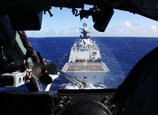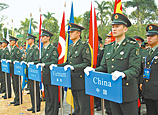
Therefore, his suggestion was "to be as cooperative as possible with regard to China" and "not to attempt to contain China within the region."
On the other hand, Westad believed that China should ensure the peace within its region. "China has the great power within the region, and the responsibility to make sure that conflicts do not spilt over," he said.
"In the past when China was weak, the defence of national sovereignty or something is understandable and necessary. Now when China has reached a position above all other countries in the region, it needs to show that it can cooperate, that it can be magnanimous and work together with others," he said.
To achieve this, the professor underscored the importance of avoiding ambiguity in policy making. "We need a China that is aware of its own self-interest and takes clear decisions in terms of the way it wants to go," he said. "Uncertainty is dangerous, particularly when a country is rising very fast."
Talking about China's new leaders, who pledged at the 18th National Congress of the Communist Party of China to "take the path of peaceful development" and "adopt the policy mutually beneficial with other countries", Westad saw the expressions "generally positive." "I hope this new Chinese leadership will live up to it," he said.
Looking into the future, he said the next five years would be significant for China. "What Chinese leaders' foreign policy in the next five years is going to be determining foreign view of China for the next 50 years, because this is the period when China has just risen to a position of great influence."
"This is the new leadership's No.1 challenge," he said.

















![]()
